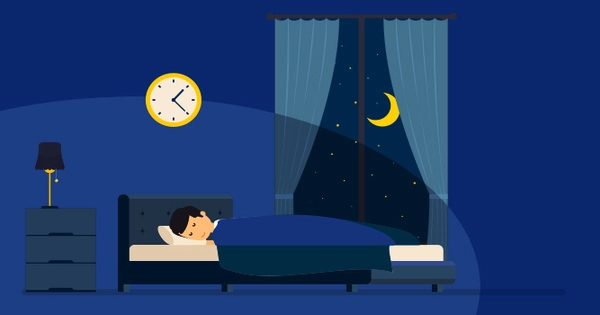There is a growing body of research that suggests that getting good quality sleep on a regular basis can have a positive impact on overall health and may contribute to a longer life span. During sleep, the body undergoes various restorative processes that are essential for physical and mental well-being. For example, sleep allows the body to repair damaged tissues, strengthen the immune system, and consolidate memories. It also helps regulate hormones that are involved in metabolism, appetite, and stress management.
According to new research presented at the American College of Cardiology’s Annual Scientific Session Together With the World Congress of Cardiology, getting enough sleep can help your heart and overall health – and possibly even how long you live. According to the study, young people who have better sleeping habits are less likely to die young. Furthermore, the data suggest that poor sleep patterns may be responsible for about 8% of all deaths.
“We saw a clear dose-response relationship, so the more beneficial factors someone has in terms of having higher quality of sleep, they also have a stepwise lowering of all cause and cardiovascular mortality,” said Frank Qian, MD, an internal medicine resident physician at Beth Israel Deaconess
Medical Center, clinical fellow in medicine at Harvard Medical School and co-author of the study. “I think these findings emphasize that just getting enough hours of sleep isn’t sufficient. You really have to have restful sleep and not have much trouble falling and staying asleep.”
We saw a clear dose-response relationship, so the more beneficial factors someone has in terms of having higher quality of sleep, they also have a stepwise lowering of all cause and cardiovascular mortality.
Frank Qian
Qian and colleagues used data from 172,321 people (average age 50, 54% female) who took part in the National Health Interview Survey between 2013 and 2018. The Centers for Disease Control and Prevention (CDC) and the National Center for Health Statistics conduct this survey each year to help gauge the health of the US population, and it includes questions about sleep and sleep habits. According to Qian, this is the first study to use a nationally representative population to examine how various sleep behaviors, rather than just sleep duration, may influence life expectancy.
Approximately two-thirds of study participants identified as White, 14.5% Hispanic, 12.6% Black, and 5.5% Asian. Researchers were able to examine the relationship between individual and combined sleep factors and all-cause and cause-specific mortality because they were able to link participants to National Death Index records (through December 31, 2019). Participants were tracked for an average of 4.3 years, during which time 8,681 people died. Of these deaths, 2,610 (30%) were caused by cardiovascular disease, 2,052 (24%) by cancer, and 4,019 (46%) by other causes.
Researchers used a low-risk sleep score developed from survey responses to assess?ve different aspects of quality sleep. The following factors were considered: 1) an ideal sleep duration of seven to eight hours per night; 2) difficulty falling asleep no more than twice per week; 3) difficulty staying asleep no more than twice per week; 4) not using any sleep medication; and 5) feeling well rested after waking up at least five days per week. Each factor was given a score of zero or one point, with a maximum of five points indicating the best possible sleep.
“If people have all these ideal sleep behaviors, they are more likely to live longer,” Qian said. “So, if we can improve sleep overall, and identifying sleep disorders is especially important, we may be able to prevent some of this premature mortality.”

Researchers controlled for other factors that could have increased the risk of death in the study, such as lower socioeconomic status, smoking and alcohol consumption, and other medical conditions. Those with all five favorable sleep factors were 30% less likely to die for any reason, 21% less likely to die from cardiovascular disease, 19% less likely to die from cancer, and 40% less likely to die from causes other than heart disease or cancer. These other deaths, according to Qian, are most likely the result of accidents, infections, or neurodegenerative diseases such as dementia and Parkinson’s disease, but more research is needed.
Among men and women who reported having all five quality sleep measures (a score of five), life expectancy was 4.7 years greater for men and 2.4 years greater for women compared with those who had none or only one of the five favorable elements of low-risk sleep. More research is needed to determine why men with all five low-risk sleep factors had double the increase in life expectancy compared with women who had the same quality sleep.
“Even at a young age, if people can develop these good sleep habits of getting enough sleep, making sure they’re sleeping without too many distractions, and having good sleep hygiene overall, it can greatly benefit their overall long-term health,” Qian said, adding that while the current study estimated gains in life expectancy beginning at age 30, the model can also be used to predict gains at older ages. “It is critical for young people to understand that many health behaviors accumulate over time. It’s never too late to exercise or quit smoking, and it’s never too early to start. And we should talk about and evaluate sleep more frequently.”
These sleep habits can be easily asked about during clinical encounters, and the researchers hope patients and clinicians will start talking about sleep as part of their overall health assessment and disease management planning.
One study limitation was that sleep habits were self-reported rather than objectively measured or verified. Furthermore, no information was available about the types of sleep aids or medications used, as well as how frequently or for how long participants used them. Future research is needed to understand how these gains in life expectancy may continue as people age, as well as to further investigate the observed gender differences.
Previous research has shown that getting too little or too much sleep can be harmful to the heart. Sleep apnea, a sleep disorder that causes someone to pause or stop breathing while asleep, has also been linked to a number of heart conditions, including high blood pressure, atrial fibrillation, and heart attacks.
















